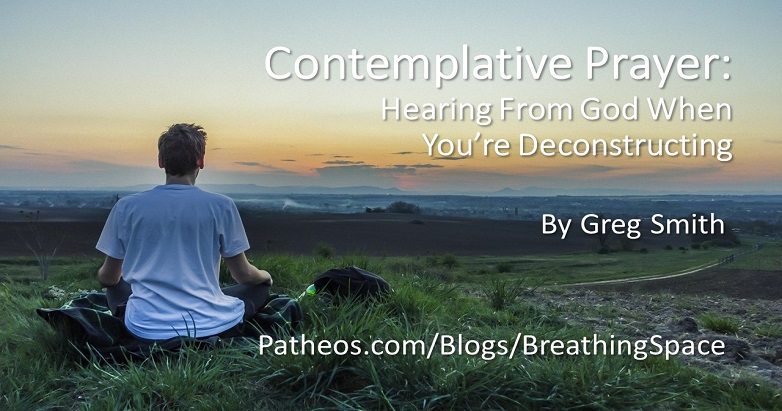Contemplative prayer is beginning with the ending. Most of us end our prayers with the simple word, amen. Instead of spending your time asking for things, contemplative prayer is all about the amen.

This is the final article in a series on using Lectio Divina to hear from God when you’re deconstructing. In my first article, “Lectio Divina: Hearing from God When You’re Deconstructing,” I discuss Benedict of Nursia’s ancient practice of Lectio, which is soaking in scripture to hear a single word from God to you. My second article, “Christian Mantras: Hearing from God When You’re Deconstructing” is about Benedict’s Meditatio, or repeating that sacred word as your mantra. In my third article, “How to Pray When You’re Deconstructing,” I observe how Christians who deconstruct often find it difficult to pray. I discuss Benedict’s third step, Oratio, and how to use the sacred word to pray the Lord’s Prayer. To conclude our exploration of Lectio Divina, we focus on Benedict’s final step, Contemplatio, or contemplative prayer.
Resting in the Amen
Simply put, contemplation is resting in the “amen.” As you practice all four steps of Lectio Divina, you move from reading scripture, repeating a sacred word or phrase, and then praying that sacred word. Generally, we end our prayers with amen. Now, in the fourth step, we simply rest in that.
Don’t let your amen mean “Ok, I’m done praying now, so I’m going to hang up the phone.” Instead, say amen and then spend about a quarter-hour resting in that peaceful acceptance. Amen means let it be. It is a word of simple reliance, trust, and relaxing in God’s ability to do all that you could ever ask or imagine. Psalm 46:10 (NIV) says, “Be still, and know that I am God.” Contemplation is being still, waiting on the divine presence, trusting God to complete what has begun in you. Contemplation is uncomplicated in that it involves no reading, no repeating, no forming your own thoughts into words. It is simply resting in God’s presence.
It’s Not About You
The thing to remember when practicing contemplative prayer is that it’s not about you. In fact, in contemplative prayer, the ultimate goal is to empty yourself and be in God’s presence. This doesn’t mean that you’re “opening your soul to whatever spirit wants to come in,” as fearful fundamentalists suggest when they warn you against contemplative prayer. It means that you’re emptying yourself of ego, realizing that “I no longer live, but Christ lives in me (Galatians 2:20 NIV).” Instead of filling your mind with the things that you want or think, simply rest in the passive attitude of a person who truly means it when they say amen. Put it to rest. Let it be.
Contemplative Prayer and the Devil
Many conservatives warn against contemplative prayer, fearing that something bad could happen when you pause and reflect. Some say a demon could come into you if you empty your mind. In a recent conversation about this, Don Salmon, an online friend, and proprietor of Remember to Be: Train Your Brain, Change the World, told me about encountering people who believed this. He gave permission to share this story:
…One day, two Jehovah’s Witnesses come knocking at our door. I open the door smiling, and we talk a bit. I ask them if they have heard of Christian contemplative prayer.
They say no, and I quote the Bible verse where Paul tells the Athenians that the wise of “ancient” times referred to God as “He in whom we live and move and have our being.” They were horrified by this, insisted that could not be in the Bible, and sure enough, the translation they used had changed it to “He THROUGH whom we live and move and have our being.”
I explained a bit more and then they both told me in no uncertain terms that the only way to pray was to use words, otherwise the devil could get in.
I paused, and then asked one of them, “Do you have a picture of Jesus in your home?”
She said that of course she did. So, I asked her, “Have you ever come home, looked at the picture, and felt your heart swelling with love and devotion?”
“Why yes, I have. It’s quite wonderful.”
“So,” I continued, “If you just stood there for five or ten seconds, feeling this deep devotion to your Lord and Savior, you wouldn’t consider it a problem?”
“No, of course not.”
I then asked, “Well, if you continued like this for maybe, oh, 20 or 30 seconds, is that alright?”
She apparently didn’t see where I was going with this, and quickly nodded in the affirmative.
“So, would it be ok if you continued feeling this love and adoration for your Lord and Savior for 60 seconds?”
At this point, it was obvious she realized the implications, paused a bit, then somewhat reluctantly acknowledged that, “Yes, I think that would be alright.”
“Well,” I said, “you have just practiced contemplative meditation.”!
A Wandering Mind
Often, people who practice contemplative prayer say that the biggest problem is a wandering mind. You may have difficulty sitting in silence, trying to think nothing, and simply listening for God’s still, small, voice. If this happens, simply speak your Logos or sacred word that stood out to you during your time of scripture reading. Don’t repeat it over and over as in Meditatio. Just say it once, allowing it to bring you back to a place of silence. Then sit quietly. Trust God. Listen to God. Let God fill you. When your mind wanders again, repeat this process. This isn’t about achieving some altered state of consciousness (although that can happen). It’s about constantly returning and resting in the amen.
Hearing from God When You’re Deconstructing
Christians in the deconstruction process often say that it’s difficult to hear from God. Theological conundrums, scriptural inconsistencies, and hypocrisies within the church seem to crowd out the divine presence. Some have told me, “I still believe in God, but my views of God are changing. I just wish I could hear from God while I deconstruct.” For this, I recommend Benedict’s Lectio Divina, an ancient prayer method that refreshes your soul. Instead of centering itself on theology, it centers on experience. Instead of being self-centered as our prayers generally are, this practice is God-centered. I invite you to try it for yourself and see how you can still feel spiritually balanced, even while you deconstruct.












